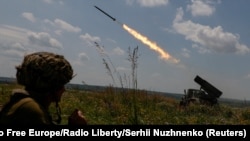Latest developments:
- The Ukrainian and Polish presidents jointly marked the anniversary Sunday of the World War Two-era massacres of Poles by Ukrainian nationalists. The killings have caused tension between the two countries for generations. Ukrainian President Volodymyr Zelenskyy said, “Together with [President] Andrzej [Duda], we honored the memory of all the victims in Volyn. We value every life, remember history, and defend freedom together.”
- Russian air defense systems downed four missiles Sunday, Russian officials said on Telegram. One of the drones was shot down over the annexed Crimean Peninsula and three over Russia's Rostov and Bryansk regions, which border Ukraine. Moscow alleges Ukraine regularly targets areas inside Russia. Kyiv denies these accusations, saying it is fighting a defensive war.
- Russian Foreign Minister Sergey Lavrov discussed the Black Sea grain deal in a phone call Sunday with his Turkish counterpart, Hakan Fidan, Russia's foreign ministry said. Moscow has been threatening to quit the deal, expiring July 17, that allows the safe passage of grain and fertilizer from Ukrainian ports in the Black Sea if its terms to export its own grain and fertilizer are not met.
If Ukraine were to become a NATO member before the war’s end, it would drag the whole alliance into the conflict against Russia, said U.S. President Joe Biden in an interview that aired Sunday on CNN.
The U.S. president also said that before Ukraine is considered for NATO membership, it will take time to meet all the qualifications required “from democratization to a whole range of other issues.” In the meantime, he expressed the U.S. commitment to provide Ukraine “the weaponry they need, the capacity to defend themselves.”
Biden will be in Europe this week for a three-nation tour that includes attending the NATO summit in Vilnius, Lithuania, July 11-12. He said there is no unanimity in NATO on whether to bring Ukraine into the alliance in the middle of the war, emphasizing that “holding NATO together is really critical.”
Watch related video by Patsy Widakuswara:
Ukrainian President Volodymyr Zelenskyy said Sunday on ABC’s “This Week,” that during the summit, he hopes to “do whatever he can to… expedite solutions for an agreement with our partners.”
Zelenskyy also touted Ukraine’s value as a future NATO country member “with actually the strongest armed forces in Europe.”
“Ninety percent of Ukrainians want to be a part of NATO. More than 90% of Ukrainians want to be a part of the European Union,” he said.
US allies on cluster bombs
U.S. Senator Tim Kaine and U.S. Representative Barbara Lee, both Democrats, expressed concerns Sunday over the White House decision to send cluster bombs to Ukraine to combat the Russian invasion.
Kaine, who sits on the Senate Armed Services Committee, said he had "some real qualms" about the U.S. decision because it could inspire other countries to bypass the international convention barring the munitions.
"It could give a green light to other nations to do something different as well," Kaine said on “Fox News Sunday.” However, he said that he "appreciates the Biden administration has grappled with the risks." Kaine also affirmed that Ukraine had given assurances that they were not going to use these munitions against Russian civilians.
Republican U.S. Representative Michael McCaul, chairman of the House of Representatives Foreign Affairs Committee, told CNN Sunday, Ukraine’s counteroffensive was going slowly and that the cluster bombs could be a "game changer" for the Ukrainians, adding that he’s pleased the administration has finally agreed to do this."
However, Lee urged the Biden administration to reconsider the move.
"Cluster bombs should never be used. That's crossing a line," she told CNN's "State of the Union,” adding the United States risked losing its "moral leadership" by delivering cluster bombs to Ukraine.
National Security Council spokesperson John Kirby defended the U.S. decision to send cluster munitions to Ukraine, saying Sunday that it will keep the country “in the fight,” as Ukrainian forces are running out of regular artillery ammunition.
Watch related video by Veronica Balderas Iglesias:
U.S. allies and Russia reacted Saturday to the U.S. decision to supply Ukraine with controversial cluster munitions that are banned by more than 100 entities, though not the U.S., Russia and Ukraine.
Canada, Britain, Spain, Germany and U.N. Secretary-General Antonio Guterres all expressed opposition to the U.S. decision.
Ukrainian Defense Minister Oleksii Reznikov welcomed the U.S. announcement to deliver cluster bombs to Kyiv and promised the munitions would be used only in Russian-occupied Ukrainian territories and not in Russia.Reznikov said on Twitter that the new weapons “will significantly help us to de-occupy our territories while saving the lives of the Ukrainian soldiers.”
Ukrainian Defense Minister Oleksii Reznikov welcomed the U.S. announcement and promised the cluster munitions would be used only in Russian-occupied Ukrainian territories and not in Russia.
Reznikov said on Twitter that the new weapons “will significantly help us to de-occupy our territories while saving the lives of the Ukrainian soldiers.”
Cluster munitions typically release large numbers of smaller bomblets that can kill indiscriminately over a wide area. Those that fail to explode upon contact with the ground then pose a danger for decades.
Moscow described the U.S. decision as another egregious example of Washington's anti-Russian course.
VOA White House Bureau Chief Patsy Widakuswara, VOA National Security Correspondent Jeff Seldin, and VOA U.N. Correspondent Margaret Besheer contributed to this report. Some information came from The Associated Press, Agence France-Presse and Reuters.









